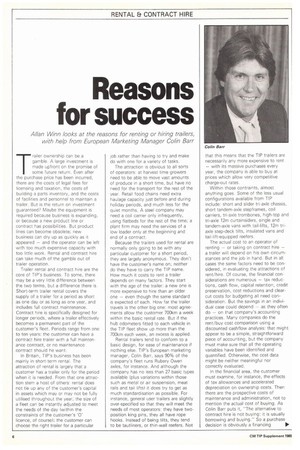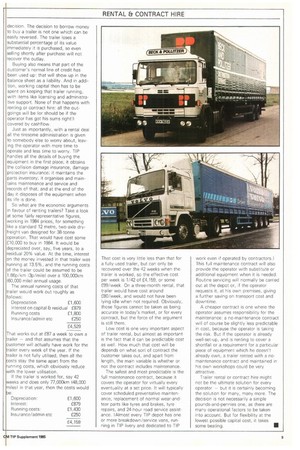Reasons for success
Page 124

Page 127

If you've noticed an error in this article please click here to report it so we can fix it.
Allan Winn looks at the reasons for renting or hiring trailers, with help from European Marketing Manager Colir? Barr
Trailer ownership can be a gamble. A large investment is made upfront on the promise of some future return. Even after the purchase price has been incurred, there are the costs of legal fees for licensing and taxation, the costs of building a parts inventory, and the costs of facilities and personnel to maintain a trailer. But is the return on investment guaranteed? Maybe the equipment is required because business is expanding, or because a new product line or contract has possibilities. But product lines can become obsolete; new business can dry up as quickly as it appeared — and the operator can be left with too much expensive capacity with too little work. Rental and contract hire can take much of the gamble out of trailer operation.
Trailer rental and contract hire are the core of TIP's business. To some, there may be a very little difference between the two terms, but a difference there is Short-term trailer rental covers the supply of a trailer for a period as short as one day or as long as one year, and includes full contract maintenance. Contract hire is specifically designed for longer periods, where a trailer effectively becomes a permanent part of the customer's fleet. Periods range from one to ten years: the customer can have a contract hire trailer with a full maintenance contract, or no maintenance contract should he want.
In Britain, TIP's business has been mainly in short-term rental. The attraction of rental is largely that a customer has a trailer only for the period when it is needed. From that one attraction stem a host of others: rental does not tie up any of the customer's capital in assets which may or may not be fully utilised throughout the year; the size of a fleet can be instantly adjusted to meet the needs of the day (within the constraints of the customer's '0' licence, of course); the customer can choose the right trailer for a particular job rather than having to try and make do with one for a variety of tasks.
The attraction is obvious to all sorts of operators: at harvest time growers need to be able to move vast amounts of produce in a short time, but have no need for the transport for the rest of the year. Retail food chains need extra haulage capacity just before and during holiday periods, and much less for the quiet months. A steel company may need a coil carrier only infrequently, using flatbeds for the rest of the time; a plant firm may need the services of a low loader only at the beginning and end of a contract.
Because the trailers used for rental are normally only going to be with any particular customer for a short period, they are largely anonymous. They don't have the customer's name on; neither do they have to carry the TIP name. How much it costs to rent a trailer depends on many factors. They start with the age of the trailer: a new one is more expensive to hire than an older one — even though the same standard is expected of each. How far the trailer travels is the other big one: most agreements allow the customer 700km a week within the basic rental rate. But if the hub odometers fitted to each vehicle in the TIP fleet show up more than the 700km each week, an excess is applied.
Rental trailers tend to conform to a basic design, for ease of maintenance if nothing else. TIP's European marketing manager, Colin Barr, says 90% of the company's fleet runs Rubery Owen axles, for instance. And although the company has no less than 27 basic types available (plus variations within those such as metal or air suspension, meat rails and tail lifts) it does try to get as much standardisation as possible. For instance, general user trailers are slightly over-specified so that they will meet the needs of most operators: they have two. position king pins, they all have rope hooks. Instead of being tilts, they tend to be tautliners, or thin-wall reefers. Not that this means that the TIP trailers are necessarily any more expensive to rent — with its massive purchases every year, the company is able to buy at prices which allow very competitive charge-out rates.
Within those contraints, almost anything goes. Some of the less usual configurations available from TIP include: short and slider tri-axle chassis, short tandem-axle stepframes, coil carriers, tri-axle trombones, high-top and tri-axle 12m curtainsiders, single and tandem-axle vans with tail-lifts, 12m triaxle step-deck tilts, insulated vans and tail-lift-equipped reefers.
The actual cost to an operator of renting — or taking on contract hire — a trailer will depend on his own circumstances and the job in hand. But in all cases the same factors need to be considered, in evaluating the attractions of rent/hire. Of course, the financial considerations are numerous — tax reductions, cash flow, capital retention, credit preservation, cost reductions and clearcut costs for budgeting all need consideration. But the savings in an individual case could depend — as they often do — on that company's accounting practices. Many companies do the rent/buy cost comparison using a discounted cashflow analysis: that might appear to be a simple, straightforward piece of accounting, but the company must make sure that all the operating variables have been identified and quantified. Otherwise, the cost data might be neither meaningful nor correctly evaluated.
In the financial area, the customer must examine, for instance, the effects of tax allowances and accelerated depreciation on ownership costs. Then there are the prospective costs of maintenance and administration, not to mention the actual cost of buying. As Colin Barr puts it, "The alternative to contract hire is not buying: it is usually borrowing and buying." So a purchase decision is obviously a financing decision. The decision to borrow money to buy a trailer is not one which can be easily reversed. The trailer loses a substantial percentage of its value immediately it is purchased, so even selling shortly after purchase will not recover the outlay.
Buying also means that part of the customer's normal line of credit has been used up: that will show up in the balance sheet as a liability. And in addition, working capital then has to be spent on keeping that trailer running, with items like licensing and administrative support. None of that happens with renting or contract hire: all the outgoings will be (or should be if the operator has got his sums right!) covered by cashflow.
Just as importantly, with a rental deal all the tiresome administration is given to somebody else to worry about, leaving the operator with more time to operate and less time to worry. TIP handles all the details of buying the equipment in the first place; it obtains the collision damage insurance, damage protection insurance; it maintains the parts inventory; it organises and maintains maintenance and service and records of that; and at the end of the day it disposes of the equipment when its life is done.
So what are the economic arguments in favour of renting trailers? Take a look at some fairly representative figures, working in 1984 prices, for something like a standard 12 metre, two-axle dryfreight van designed for 38-tonne operation. That would have cost some £10,000 to buy in 1984. It would be depreciated over, say, five years, to a residual 20% value. At the time, interest on the money invested in that trailer was running at 13.5%, and the running costs of the trailer could be assumed to be 1.86p/km (3p/mile) over a 100,000km (60,000 mile) annual usage.
The annual running costs of that trailer would work out roughly as follows: Depreciation £1,600 Interest on capital 8residual £879 Running costs £1,800 Insurance/admin etc £250 £4,529 That works out at £87 a week to own a trailer — and that assumes that the customer will actually have work for the trailer every week of the year. If the trailer is not fully utilised, then all the costs stay the same apart from the running costs, which obviously reduce with the lower utilisation.
If the trailer is worked for, say 42 weeks and does only 77,000km (48,000 miles) in that year, then the costs would be: That cost is very little less than that for a fully-used trailer, but can only be recovered over the 42 weeks when the trailer is worked, so the effective cost per week is 1/42 of £4,159, or some £99/week. On a three-month rental, that trailer would have cost around E80/week, and would not have been lying idle when not required. Obviously, those figures cannot be taken as being accurate in today's market, or for every contract, but the force of the argument is still there.
Low cost is one very important aspect of trailer rental, but almost as important is the fact that it can be predictable cost as well. How much that cost will be depends on what sort of contract the customer takes out, and apart from length, the main variable is whether or not the contract includes maintenance.
The safest and most predictable is the full maintenance contract, because it covers the operator for virtually every eventuality at a set price. It will typically cover scheduled preventative maintenance, replacement of normal wear-andtear parts like tyres and brakes, tyre repairs, and 24-hour road service assistance. (Almost every TIP depot has one or more breakdown/service vans, running in TIP livery and dedicated to TIP work even if operated by contractors.) This full maintenance contract will also provide the operator with substitute or additional equipment when it is needed. Routine servicing will normally be carried out at the depot or, if the operator requests it, at his own premises, giving a further saving on transport cost and downtime.
A cheaper contract is one where the operator assumes responsibility for the maintenance: a no-maintenance contract will of course be slightly less predictable in cost, because the operator is taking the risk. But if the operator is already well-set-up, and is renting to cover a shortfall or a requirement for a particular piece of equipment which he doesn't already own, a trailer rented with a nomaintenance contract and maintained in his own workshops could be very attractive.
Trailer rental or contract hire might not be the ultimate solution for every operator — but it is certainly becoming the solution for many, many more. The decision is not necessarily a simple pounds-and-pennies one, as there are many operational factors to be taken into account. But for flexibility at the lowest possible capital cost, it takes some beating.












































































































































